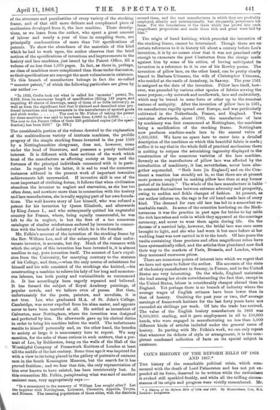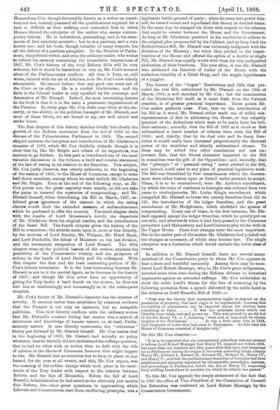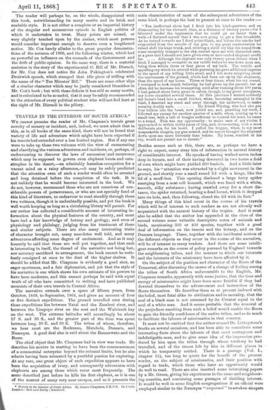COX'S HISTORY OF THE REFORM BILLS OF 1866 AND 1867.*
THE history of the remarkable political crisis, which com- menced with the death of Lord Palmerston and has not yet ex- pended all its force, deserved to be written while the enthusiasm it evoked still sparkled freshly, and while all the trifling circum- stances of its origin and progress were vividly remembered. Mr.
• d History of the Reform Bills of 1866 and 1867. By Homersham Cox, M.A. London : Longmans.
Homersham Cox, though favourably known as a writer on consti- tutional law, scarcely possessed all the qualifications required for a task so difficult as that walking over concealed fires to which Horace likened the enterprise of the author who essays contem- porary history. He is industrious, painstaking, and in his state- ments of fact minutely accurate ; but he is a partizan, and a very hearty one ; and his book, though valuable in many respects, has all the defects of a partizan pamphlet. To the Member of Parlia- ment, the political writer, and even the ordinary reader, who wishes to refresh his memory concerning the remarkable transactions of 1867, Mr. Cox's history of the rival Reform Bills will be very welcome, but it would be hazardous to rely on Mr. Cox's account alone of the Parliamentary conflicts. All that is Tory, or, still worse, tainted with the air of Adullam, is in Mr. Cox's view utterly abominable. He cannot believe that any good can come out of the Cave or its allies. He is a cordial Gladstonian, and his faith in the Liberal leader is only equalled by his contempt and detestation of Mr. Disraeli. Indeed, the most interesting feature in the book is that it is in the main a passionate impeachment of the Premier. In every page Mr. Cox deals some blow at the sin- cerity, or the ability, or the political foresight of Mr. Disraeli, and most of these blows, we are bound to say, are well aimed and strike home.
The first chapter of this history sketches briefly but clearly the growth of the Reform movement from the Act of 1832 to the decease of the Palmerstonian Parliament in 1865. The second chapter narrates the inception and introduction of Mr. Gladstone's measure of 1866, which Mr. Cox dutifully defends, though it is clear that he, like Mr. Bright and others of its supporters, was anxious to go further. In this part is introduced one of the most valuable discussions in the volume, a lucid and concise statement of the law of rating in its relation to the franchise. This subject, Mr. Cox justly observes, was utterly unknown, in the beginning of the session of 1866, to the House of Commons, except to some half-dozen members, among whom we must include Mr. Gladstone and Mr. Bright. Even at the end of the following year, as Mr. Cox points out, the great majority were unable, or did not take the pains to unravel the mysteries of compounding ; and Mr. Disraeli himself, when introducing his Bill in March, 1867, ex- hibited gross ignorance of the manner in which the rating clauses would limit the extended measure of enfranchisement which he professed to offer the country. The third chapter deals with the results of Lord Groevenor's revolt, the departure of Mr. Gladstone from his original resolve, and the introduction of the Seats' Bill. The fourth chapter gives the history of the Bill in committee ; the attacks made upon it, more or less directly, by the motions of Lord Stanley, Mr. Walpole, Mr. Ward Hunt, and Lord Dunkellin, the defeat of Ministers on the last division, and the consequent resignation of Lord Russell. The fifth chapter sums up the political lessons of the session, explains the possibility of the Conservative victory, and the prospects of reform in the hands of Lord Derby and his colleagues. With this chapter the first and the least interesting portion of Mr. Cox's history terminates. It is the least interesting because Mr. Disraeli is not in it the central figure, as he becomes in the history of 1867; and though Mr. Cox never loses an opportunity of giving the Tory leader a hard knock on the sconce, he does not bait him so unrelentingly and unceasingly as in the subsequent chapters.
Mr. Cox's theory. of Mr. Disraeli's character has the interest of novelty. It assumes rather than establishes by coherent evidence that the Premier is not only an insincere, but an incapable politician. This view directly conflicts with the ordinary notion that Mr. Disraeli's conduct during last session was a marvel of astuteness and knowledge of human nature, or, at least, Parlia- mentary nature. It also directly controverts the "education " theory put forward by Mr. Disraeli himself. Mr. Cox insists that in the beginning of 1867, Mr. Disraeli had actually no policy whatever, that he literally did not understand the suffrage question, that he had no other wish or notion than to drift with the tide of opinion in the House of Commons, however that might happen to run. Mr. Disraeli had no intention but to keep in place, at any hazard, for the year at all events, and this, Mr. Cox argues, was the meaning of the sadden change which took place in the senti- ments of the Tory leader with respect to the relation between Reform and the fate of Ministries. Before the fall of Lord Russell's Administration he had acted on the obviously just motive that Reform, like other great questions, in approaching which Liberals and Conservatives start from conflicting principles, was a
legitimate battle-ground of party ; when he came into power him- self, he turned round and repudiated this theory in decided terms. In the same way he changed his front with respect to the relation that ought to subsist between the House and the Government. As long as Mr. Gladstone persisted in his resolution to adhere to the original plan propounded by his Cabinet, and to keep back the Redistribution Bill, Mr. Disraeli was virtuously indignant with the dictation of the Ministry ; but when they yielded to the impor- tunities of the House and offered the option of a double or single Bill, Mr. Disraeli was equally wroth with them for this undignified abdication of their functions. The year after, it was Mr. Disraeli who abdicated his function of leader of the House with the
audacious humility of a Uriah Heep, and the supple legerdemain of a juggler.
The history of the " bogus " Resolutions and Bills that pre- ceded the real Bill, introduced by Mr. Disraeli on the 18th of March, 1867, is well sketched by Mr. Cox ; but the examination of the Disraelian Bill itself, as it came fresh from the Cabinet crucible, is of greater practical importance. Three points Mr. Cox makes perfectly clear. First, that on the introduction of his Bill as it stood, Mr. Disraeli either made use of wilful mis- representation of fact in addressing the House, or was culpably ignorant of the deductions which were to be made from his bril- liant estimate ; secondly, that the Bill of 1867 as it stood at first enfranchised a lesser number of citizens than even the Bill of 1866 ; and, thirdly, that by its dual vote and its fancy fran- chises it would really have increased proportionally the electoral power of the wealthier and already enfranchised classes. To these may be added two other conclusions not less im- portant, first, that the liberal character imparted to the Bill in committee was the gift of the Opposition ; and, secondly, that the " principle " of " personal rating " never existed in the Bill, nor, indeed, could exist in any piece of practical legislative work. The Bill was liberalized by four amendments which the Govern- ment were either beaten upon or forced under pressure to accept. These, it is to be remembered, were Mr. Ayrton's amendment,
by which the term of residence in boroughs was reduced from two years to twelve] months, Mr. Locke King's amendment, which
compelled Mr. Disraeli to lower the county franchise from 151. to 121., the introduction of the lodger franchise, and the great amendment of Mr. Hodgkinson, which abolished the system of compounding. Every one of these, in the first instance, Mr. Dis- raeli opposed, except the lodger franchise, which he quietly put on one aide, and afterwards when it had been passed in the Commons permitted Lord Malmesbury and Lord Cairns to play tricks with in the Upper House. These four changes were the most important. But in the earlier part of the session Mr. Gladstone had pointed out ten changes as necessary, of which nine became law. The single exception was a limitation which would exclude the lower class of voters.
In addition to Mr. Disraeli himself, there are several minor members of the Conservative party to whom Mr. Cox appears to bear a keen and watchful animosity. Among these may be num- bered Lord Robert Montagu, who, to Mr. Cox's great indignation, resorted more than once during the Reform debates to historical arguments against an extended suffrage. Mr. Cox undertakes to show the noble Lord's fitness for this line of reasoning by the following quotation from a speech delivered by the noble Lord in the debates on Lord Russell's Bill of 1860 :—
" Next was the theory that representation ought to depend on the possession of property, that land ought to be represented ; because that no stability or permanence can be expected unless the electors have
something at stake It was the principle under which our liberties have taken root and grown up. This was proved by an old Act of the 8th Henry VI., c. 7, declaring what sort of men shall be chosen knights of the Parliament.' It was a little after this, in 1264, that burgesses of towns first had seats in Parliament. At this time the House of Commons consisted of knights only."
On this Mr. Cox observes :— " It is to be regretted that the conventional schoolboy was not present to inform Lord Robert Montagu that Henry VI. reigned not before 1264, but more than one hundred and fifty years after that date, that burgesses sat in Parliament during the reigns of the seven preceding kings, namely Henry 111., Edward L, Edward II., Edward III., Richard II., Henry IV., and Henry V.; and that the parliamentary franchise of boroughs had been established and minutely regulated by innumerable precedents, statutes, and proceedings in Parliament, before the Act of Henry VI. respecting forty-shilling freeholders in counties (to which he refers) was passed."
To this Mr. Cox appends the simple statement of the fact that in 1867 the office of Vice-President of the Committee of Council for Education was conferred on Lord Robert Montagu by the Conservative Government. The reader will perhaps be, on the whole, disappointed with this book, notwithstanding its many merits and its brisk and readable style. It is not either a complete or an impartial history of the singular and momentous episode in English politics of which it undertakes to treat. Many points are missed, or very slightly touched upon by the author, which most persons would consider important enough to deserve even a lengthened notice. Mr. Cox barely alludes to the great popular demonstra- tions of the autumn of 1866, and the following winter, which had so powerful an influence on the counsels of the Government and the drift of public opinion. In the same way, there is a material omission in the story of the experimental 6/. Bill of Mr. Disraeli, for Mr. Cox does not notice Sir John Pakington's celebrated Droitwich speech, which stamped that idle piece of trifling with the name of the " Ten Minutes' Bill." There are some other slips of a similar character which may be justly considered blemishes in Mr. Cox's book ; but with these defects it has still so many merits, and is calculated to be so useful, that it may be safely recommended to the attention of every political student who will not feel hurt at the sight of Mr. Disraeli in the pillory.




































 Previous page
Previous page